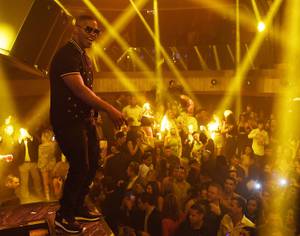Las Vegas is about to get some knowledge dropped on it. DJ Shadow and Cut Chemist will serve as professors. Legendary producer/DJ Afrika Bambaataa’s record collection will be the textbooks. And you better not skip class or you’ll miss an important lesson in hip-hop history.
DJ Shadow went through Bambaataa’s 40,000-odd records—now archived at Cornell University—which inspired the Renegades of Rhythm tour, where he and Chemist perform using six turntables and multiple crates of vinyl. Catch that tour at Brooklyn Bowl this week (and make sure to nab Shadow’s new Liquid Amber EP).
What was it like digging through Bambaataa’s crates to find records for this tour? It was surreal because it kept striking me at various times that this wasn’t just any record collection—this was the record collection that basically defines what hip-hop is. It’s just that simple. It’s not just any copy of “Apache” by The Incredible Bongo Band, it’s the copy that was played in the ’70s at block parties [where] kids who would later become MCs and producers heard that and shook them up to the point that hip-hop became their life ... It was humbling and incredible.
Did you and Cut Chemist go through the process together? We were there together throughout the whole thing. We went to New York on two separate occasions. The first time was to survey what the collection was like, because when we were asked to build the set, we wanted to know what we would be working with. Lots of times, unfortunately, [the 1970s hip-hop godfathers’] collections aren’t in tact anymore or [they’ve been] compromised throughout the years, or someone had gone in and cherry-picked them. So we wanted to make sure the collection was everything we hoped it would be. Once we went through it, we made a date to come back and pull the things that we might want to use for the set. There was a lot of stuff that we just didn’t recognize, or felt that we needed to familiarize ourselves with.
Was the collection in alphabetical order, or was it completely random? Because these materials are the property of Cornell University now … they had a pretty good idea to let people volunteer and get the collection in some kind of order. So it was an open event in New York City that lasted about a month where the records were put into a space with convenient racks and people who wanted to come and look at the materials, touch them and geek out [over] them were able to do so as long as they contributed and helped organize things … Things weren’t in strict order; there would be maybe a dozen boxes [for] the letter B, for example—any record, whether it [began with] BA or BZ would be in one of the B boxes.
Did Bambaataa make any suggestions? That was the other main thing that we wanted to have before we even agreed to do it—his blessing.
He was into it and we wanted to be very respectful. … What’s most inspiring about Bambaataa is his love of so many different types of music, and that helped really open up hip-hop … whether it was Soca [music] or dub or dancehall or calypso or go-go. It was funny because I was talking to him and mentioning some of these genres that we wanted to also play and he specifically was like, “And go-go, don’t forget go-go.” … I’ve been reading a lot of his interviews through the years. I actually went onto eBay and just bought up any magazine that he was in starting in ’82, all the way through the ’90s. He’d say in an interview, “I really want to do a song with Def Leppard.” So I was like, “Okay, I found a Def Leppard record in his collection, give it special attention because he obviously liked these guys.”
Did Bambaataa talk to you about his brothers and sisters from other planets like he did with the Weekly in 2007? No, it just kind of depends on what he wants to speak on at any given time. When I talked to him, it was usually specific questions about making sure he was cool with this or that.
Is there a historical progression planned throughout the set? Yeah, I think that’s safe to say. There’s definitely a starting point and I think it makes more sense to play more modern music later in the set because there’s definitely a big sonic shift in the way music was made in the ’70s and ’80s.
Was there a record that you were thrilled to put your hands on, that made you feel like a kid in a candy store? [There] was, and you kind of have to see [the records] to get it. When you see, for example, “It’s Just Begun” by the Jimmy Castor Bunch—which is a b-boy anthem—it’s in a lot of ways what hip-hop is all about. … To see his copy that’s he’s probably had since 1972 with the severe crate wear, tape all over it, that to me is like, “Wow, that’s it right there.” You can take a picture of that and it’s like taking a picture of the beginning of a movement, a flame, like a match being struck. The other one was his copy of the Chicago Gangsters’ “Gangster Boogie,” which is another b-boy anthem. On the back of it there were a bunch of guys from the Bronx in the ’70s tagged it up—other rappers and I think a few of the gang guys ... again, you look at it and it’s just like, wow. It’s just emblematic of everything that hip-hop was and ended up being.
DJ Shadow With Cut Chemist, Edan, Paten Locke. September 29, 8 p.m., $22. Brooklyn Bowl, 702-862-2695.





